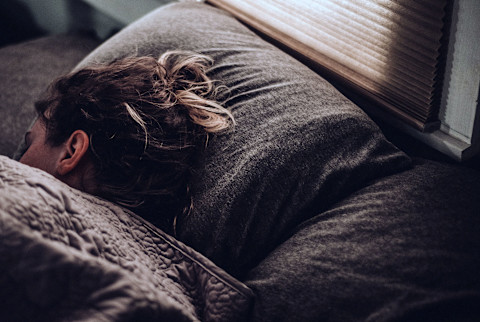
Our editors have independently chosen the products listed on this page. If you purchase something mentioned in this article, we may earn a small commission.
We’re likely not the first to tell you: Sleep is one of the most underrated elements of well-being. Think about how you feel after just a night of tossing and turning—your whole system just feels off, no? And if those sleepless nights add up, it’s a downstream problem that can affect multiple pathways, from cognitive and cardiovascular health to immunity to gut health.*
Functional medicine doctor Frank Lipman, M.D. (who recently penned a sleep-focused book titled Better Sleep, Better You), would agree: “Sleep is not a passive time,” he says on this episode of the mindbodygreen podcast. “There’s a ton of stuff happening while you’re sleeping… It’s not only cleansing your brain; it’s cleansing your [whole] system. [Sleep] affects so many body processes.”
In other words? Sleep fitness is an integral part of your well-being, just as crucial as your physical and mental fitness. But if you’re a bit lacking in the snooze department (understandable; a report from the CDC found that 1 in 3 adults don’t get enough sleep), there’s much you can do to set yourself up for sleep success—starting with your surroundings. Below, Lipman’s top tips to optimize your sleep protocol:
1. Transition into bedtime.
sleep support+
Fall asleep faster, stay asleep longer, and wake up feeling rejuvenated.*

“You can’t expect to go at a hundred miles an hour and then expect to drop and go to sleep,” says Lipman. “There needs to be some transition period between your wake time and your sleep time.”
Some transition activities include restorative yoga, relaxing music (a track with 60 beats per minute is especially helpful, as Lipman notes that’s the beat of a slow heart rate), or even something as simple as dimming the lights. Find your method to wind down and make it a routine so your mind registers that it’s bedtime.
2. Stick to an electronic sundown.
Similar to the bedtime transition period, Lipman suggests switching off electronics at least an hour or two before you go to sleep. If you’re only going to follow one of these sleepytime protocols, this would be it: According to Lipman, “[Artificial light] is one of the biggest—if not the biggest—issue with cultural arrhythmia, or why so many people have a sleep problem.”
He continues, “Melatonin, which is your primary sleep hormone, is not going to be secreted if there’s any little bit of light.” So if you’re exposed to the haze of your computer or phone screen late at night, it tricks your body into thinking it’s daytime—and your body won’t know that it needs to go to sleep.
“By not letting all that blue light in, your body gets ready to start secreting the melatonin,” Lipman adds.
“Having a completely dark room is essential,” he declares. Again, any peek of light can keep your body from producing melatonin. If you live in a bustling city, he suggests investing in some blackout curtains to keep your space dark. Or, at the very least, snag an eye mask: “The eye mask is a pretty simple way of darkening the room,” he says.
4. And the temperature cool.
We’ve discussed this before, but it bears repeating: Sleep and temperature are inherently connected. As one study explains, “The core body temperature…decreases during the nocturnal sleep phase and increases during the wake phase.” That said? Keeping your room cool can help trick your body into feeling sleepy.
In terms of the best temperature for sleep, many experts tout 65 degrees as the optimal setting. However, anything in the high 60s could work. According to Lipman, “At 67 [degrees] would probably be the warmest that I would recommend.”
Make no mistake: Your sleep fitness is an imperative part of your overall health and well-being. That said, taking the time to create an optimal sleep routine is just as important as crafting, say, a fitness regimen. If you’re looking for ways to level up your snooze, Lipman’s tips are a great way to set yourself up for success.
*If you are pregnant, breastfeeding, or taking medications, consult with your doctor before starting a supplement routine. It is always optimal to consult with a health care provider when considering what supplements are right for you.
https://www.mindbodygreen.com/articles/how-to-set-yourself-up-for-stellar-sleep









